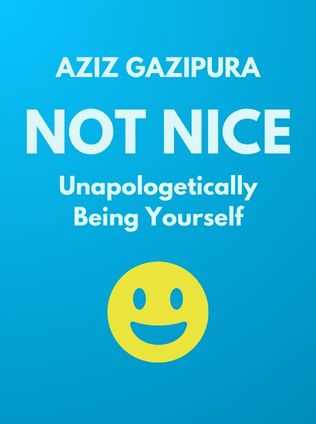
Not Nice
Stop People Pleasing, Staying Silent, & Feeling Guilty... And Start Speaking Up, Saying No, Asking Boldly, And Unapologetically Being Yourself
By Aziz Gazipura
Published 01/2017
About the Author
Aziz Gazipura is a clinical psychologist specializing in social anxiety and confidence-building. In 2011, he founded the Social Confidence Center, dedicated to helping individuals navigate social situations with greater ease and authenticity. Gazipura's work is grounded in his own experiences and a deep understanding of human psychology, making his teachings both relatable and impactful. He has authored several books, including "The Solution to Social Anxiety," "The Art of Extraordinary Confidence," and "On My Own Side," all of which explore themes related to confidence, self-assertion, and overcoming the limitations imposed by social anxiety. His most recent book, "Not Nice," critiques society's obsession with niceness and challenges readers to reexamine their own behaviors, urging them to break free from the constraints of people-pleasing and live more authentically.
Main Idea
"Not Nice" challenges the conventional notion that being nice is inherently good, proposing instead that excessive niceness can be detrimental to one's well-being and relationships. Gazipura argues that niceness is often a façade driven by a fear of rejection and a desire for approval, rather than genuine kindness. The book encourages readers to prioritize their own needs, set boundaries, and embrace their full selves, including the parts they typically hide. By doing so, individuals can develop deeper, more authentic connections with others and lead more fulfilling lives.
Table of Contents
- What It Means to Be Nice
- The Problem with Being Nice
- Steps to Stop Being Nice
- Embracing Your Full Self
- Speaking Your Mind
What It Means to Be Nice
Gazipura begins by dissecting the concept of "niceness." He explains that from a young age, we are taught to be polite, agreeable, and accommodating. These lessons are reinforced by parents, teachers, and society, leading many to equate being nice with being good. However, Gazipura argues that niceness often stems from a fear of rejection and a deep-seated need for approval, rather than a genuine desire to care for others. This distinction is crucial, as it suggests that niceness can be more about self-protection than altruism.
According to Gazipura, being nice involves following certain unspoken rules: avoid conflict, don’t hurt anyone’s feelings, and always strive to be liked. While these rules may help to avoid short-term discomfort, they come at a long-term cost, leading to inauthentic relationships and personal dissatisfaction. The author identifies three key qualities of niceness:
- The Need to Be Liked: Nice people often base their decisions on how they imagine others will respond, leading to approval-seeking behaviors. This need to be liked can result in people-pleasing, where individuals suppress their true thoughts and desires to avoid disapproval.
- Amplified Guilt: Gazipura distinguishes between healthy guilt, which arises when one's actions conflict with personal values, and unhealthy guilt, which stems from a perceived failure to meet others’ expectations. Nice people are prone to the latter, taking on excessive responsibility for others' feelings and experiencing guilt even when their actions are reasonable.
- Fear of Conflict: Many people avoid conflict because they fear it will harm their relationships. This fear often leads to conflict avoidance, where individuals suppress their true feelings and opinions to maintain peace, ultimately resulting in resentment and frustration.
"Niceness is often a set of rules we believe are necessary to earn affection and avoid rejection." - Aziz Gazipura
In this section, Gazipura lays the groundwork for understanding how societal norms around niceness can lead to a deep-seated fear of rejection and an overwhelming need for approval. These ingrained behaviors can severely limit personal growth, as individuals become trapped in patterns of people-pleasing and conflict avoidance. The author encourages readers to recognize these patterns in their own lives, setting the stage for the transformative process of becoming "not nice" in a healthy and constructive way.
The Problem with Being Nice
Gazipura argues that while being nice may seem harmless or even beneficial, it can have significant negative consequences. He outlines the mental, emotional, and physical toll that excessive niceness can take, including chronic stress, anxiety, and resentment. These emotional burdens often manifest as physical symptoms, such as headaches, muscle tension, and disrupted sleep.
Moreover, Gazipura contends that niceness prevents the development of genuine, mutually satisfying relationships. When individuals prioritize others’ needs over their own, they engage in inauthentic behavior that disconnects them from their true selves. This inauthenticity leads to superficial connections, as the other person is interacting with a façade rather than the real individual. Over time, this can erode self-esteem and hinder personal growth.
Sign up for FREE and get access to 1,400+ books summaries.
You May Also Like
The Subtle Art of Not Giving a F*ck
A Counterintuitive Approach to Living a Good Life
By Mark MansonRich Dad Poor Dad
What the Rich Teach Their Kids About Money - That the Poor and Middle Class Do Not!
By Robert T. KiyosakiHow To Win Friends and Influence People
The All-Time Classic Manual Of People Skills
By Dale CarnegieFreakonomics
A Rogue Economist Explores the Hidden Side of Everything
By Steven D. Levitt and Stephen J. Dubner



















